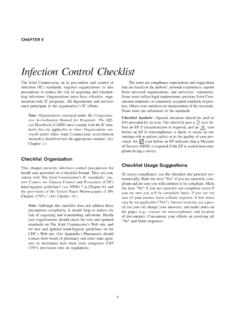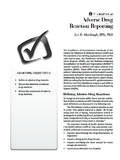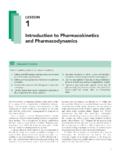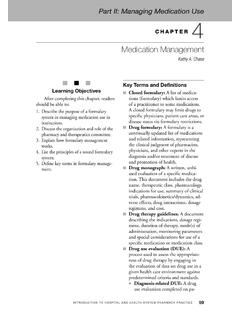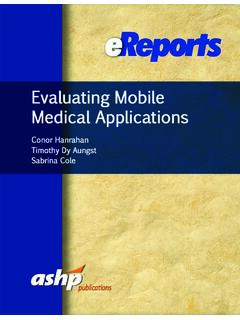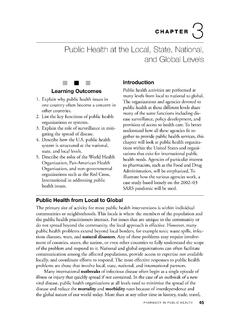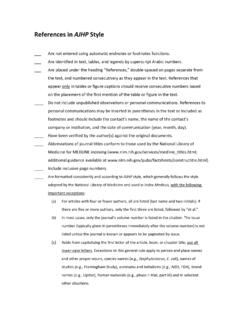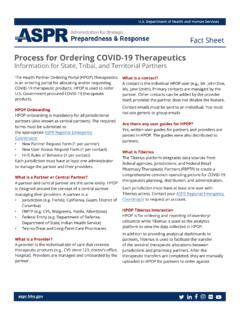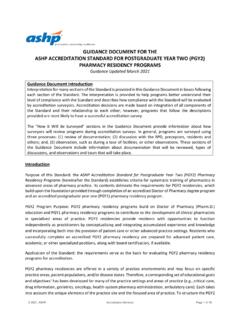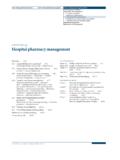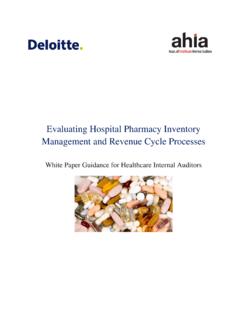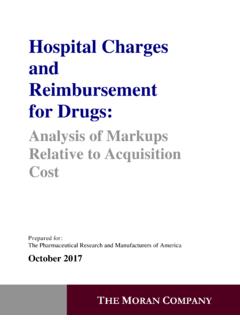Transcription of Pharmacist Billing for Ambulatory Pharmacy Patient Care ...
1 American Society of Health-System pharmacists | 7272 Wisconsin Avenue, Bethesda, Maryland 20854 | 301-657-3000 1 Pharmacist Billing for Ambulatory Pharmacy Patient Care Services in a Physician-Based Clinic and Other Non- hospital -Based Environments FAQ Date of Publication: May 2014 Contact: Justine Coffey, JD, LLM Director, ASHP Section of Ambulatory Care Practitioners Disclaimer: The information contained in this FAQ is provided for informational purposes only and should not be construed as legal, accounting, tax, other professional advice of any kind. No recipients of the report should act or refrain from acting on the basis of any content included in the report without seeking the appropriate legal or other professional advice on the particular facts and circumstances at issue from an attorney licensed in the recipient's state.
2 The content of the document contains general information and may not reflect current legal developments, verdicts or settlements. The ASHP expressly disclaims all liability in respect to actions taken or not taken based on any or all the contents of the document. The content of the document addresses topics of interest to our membership and other audiences, and is offered on a blind basis, without any knowledge as to your specific circumstances. The application and impact of relevant laws will vary from jurisdiction to jurisdiction. There may be delays or omissions in information contained in the document. The content should not be relied upon or used as a substitute for consultation with professional advisers. 2014 American Society of Health-System pharmacists .
3 All rights reserved. 1. How does Billing Ambulatory Pharmacist Patient care services in a physician-based clinic (non- hospital based) differ from Billing in a hospital -based clinic? For Medicare patients, hospital -based outpatient services (including clinics) are governed by the hospital Outpatient Prospective Payment System (HOPPS) regulations. However, physician offices and physician-based clinics providing services for Medicare patients are not governed by HOPPS, but instead are governed by a number of CMS rulings that can be found at American Society of Health-System pharmacists | 7272 Wisconsin Avenue, Bethesda, Maryland 20854 | 301-657-3000 2 This site includes the Medicare Benefit Policy Manual which describes who can bill under Medicare Part B and the 1995 and 1997 Documentation Guidelines for Evaluation and Management Services which describes the documentation required for Billing .
4 The Medicare Benefit Policy Manual describes which providers may bill under Medicare Part B. pharmacists are not recognized Medicare Part B providers except when providing immunizations. The Medicare Benefit Policy Manual, Chapter 15 Section 601 describes physician delegation to others working in their offices who provide care to Medicare patients and a mechanism for Billing such services. The title of this Chapter is Services and Supplies Furnished Incident to a Physician s/NPP s Professional Service and governs the services pharmacists provide in a non-institutional setting. These services are often termed incident to. Under these rules, pharmacists can bill for their services in a physician-based clinic. These rules differ in their processes from the HOPPS regulations.
5 Non-institutional physician-based offices and clinics may negotiate specific contracts with private payers that may include a different mechanism for payment to enable Pharmacist reimbursement for Patient care services, 2 including utilizing a direct payment process incorporating the Medication Therapy Management (MTM) CPT codes or another preferred , 3, 4 Alternatively, Pharmacist -based services may be folded into a capitated payment model and or associated with pay for performance incentives. If there are no specific contracts with private payers, Billing for Pharmacy services defaults to Medicare regulations. Medicare patients by law may not be treated differently than other patients. In certain states, Medicaid rules and laws may allow payment for Pharmacist -provided Patient care services in the Ambulatory setting.
6 2. If I am employed by another entity ( school of Pharmacy ), but also practice in a physician-based clinic, how do I bill for my services? In order for pharmacists to bill incident-to the physician, Medicare stipulates that nine requirements must be met. As long as the following requirements are met, you may bill for your services using incident-to Billing in the physician-based , 2 A. The Patient must first be seen by the physician for an evaluation or a Medicare covered service. B. The physician must have provided authorization for the service in the medical record. (Usually done by a standard referral process). C. The physician must continue to see the Patient at a frequency that reflects his/her active participation in the management of the course of treatment.
7 Review of the medical record does not qualify. Although not defined, Medicare fiscal intermediaries may have rules such as a one of three rule, or every third visit must be a physician visit. However you choose to interpret this ruling, it should be reasonable and customary. D. The service provided by you, the Pharmacist , is commonly furnished in a physician or Medicare Part B provider s office or clinic. E. The service must be medically appropriate to be given in the provider s office or clinic. American Society of Health-System pharmacists | 7272 Wisconsin Avenue, Bethesda, Maryland 20854 | 301-657-3000 3 F. Services provided by a Pharmacist incident to the physician must be within the Pharmacist s scope of practice as dictated by the state s Pharmacy Practice Act.
8 G. Services and supplies must be furnished in accordance with applicable State law. Any other state laws besides the Pharmacy Practice Act that affect your service must be adhered to. H. A physician or Medicare Part B-approved practitioner must be on the premises, but not necessarily in the room when incident-to services are performed. The supervising practitioner must be part of the organization. I. The Pharmacist providing the incident-to service must be an employee, leased or contracted to the physician or Medicare Part B-approved provider. The practice must have some legal control over the person and his or her services, and the person must represent an expense to the practice. (Expense may include salary, non-salary support such an exam room, office supplies, staff support etc.)
9 3. Can a physician, nurse practitioner, physician assistant, or other recognized provider provide direct supervision in a physician-based clinic? FAQ 2 (F), above, states that a physician or Medicare Part B approved practitioner must be on the premises to provide direct supervision. The Medicare Benefits Policy Manual describes those who are Medicare Part B-approved practitioners, and that list does include nurse practitioners and physician assistants. It is important to note that this may vary in interpretation by the regional Medicare Fiscal Intermediaries who are contracted by Medicare to administer the Medicare benefit in their , 6 4. Must the supervising clinician review and sign off on all Pharmacist notes? There is no requirement that the physician or supervising provider must sign off on all Pharmacist notes.
10 The requirement states that the physician or supervising provider establishes the plan of care for the Patient that authorizes your service, and the physician or supervising provider must continue to be actively involved in that plan of care. How Medicare Fiscal Intermediaries and your organization interpret that statement may vary, including requiring the supervising provider to sign the Pharmacist notes as an indication that she is aware of your activity, following up with a face-to-face visit with the Patient at a reasonable frequency indicating active involvement, or some other process that would reasonably be considered to meet the active involvement requirement of the 5. Can a Pharmacist use the MTM CPT codes when working in a physician-based clinic?
